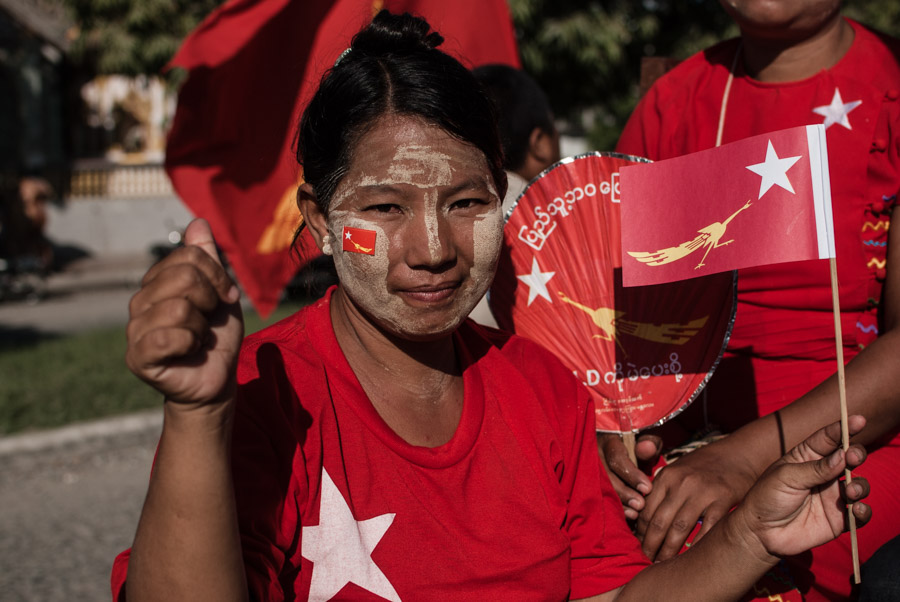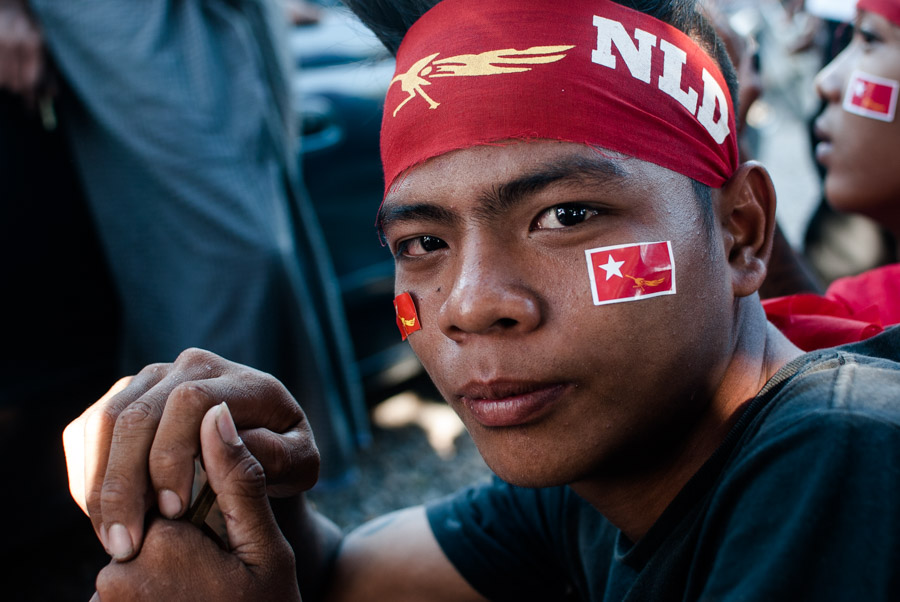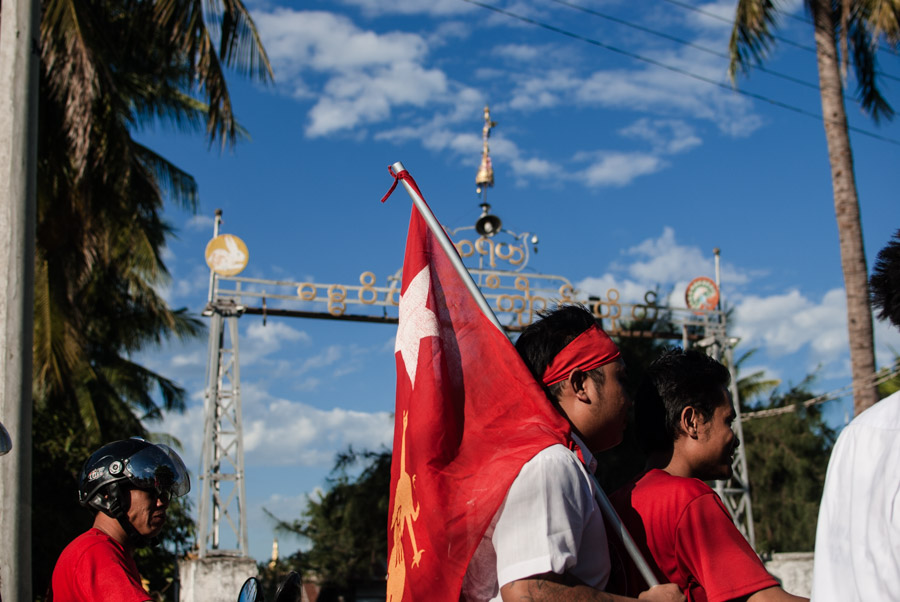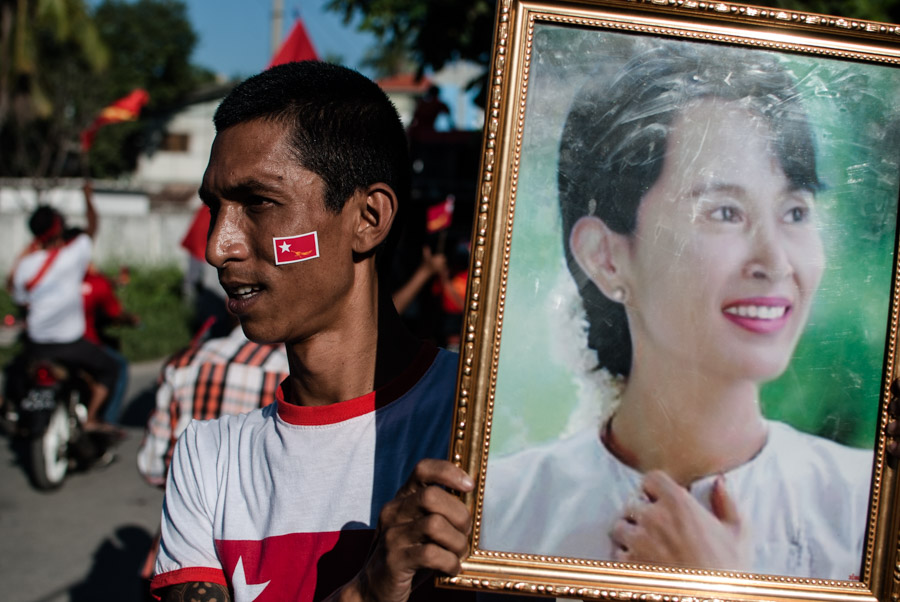On Nov. 8, an estimated 30 million people took part in Myanmar’s first free national election in a quarter-century. From the shores of the Andaman Sea to the Himalayan uplands, many lined up in the pre-dawn gloom before voting stations officially opened at 6 a.m. Vying for citizens’ votes across some 1,171 constituencies were 6,189 candidates from a total of 93 parties. For most voters, however, it came down to two. On one side was the ruling Union Solidarity and Development Party (USDP), the drab political proxy of the powerful Tatmadaw, Myanmar’s military, which has ruled the country for more than half a century; on the other was the opposition National League for Democracy (NLD), led by the talismanic Daw Aung San Suu Kyi, a Nobel Peace Prize laureate and international symbol of Myanmar’s long struggle for democracy. Two parties: one symbolizing decades of military rule, the other symbolizing change.
In the end, the people’s choice was unambiguous. “I think it’s very important for us to choose a new government—a good government,” said Maung Maung Gyi, a 56-year-old businessman, shortly after casting his vote for the NLD at a Buddhist pagoda in Mandalay, Myanmar’s former royal capital. “The whole world is watching this election.” By evening, euphoric crowds of NLD supporters, draped in the party’s red star-and-peacock insignia, had gathered in the streets to cheer the unofficial election results, which showed massive leads for NLD candidates in most of the country. This was later confirmed by the Union Election Commission, which released official results indicating the NLD had gained an astonishing 390 of the 498 elected seats in the bicameral parliament. Despite its incumbency and massive advantage in resources, the USDP won just 41 seats, with the remainder going to small parties.
Myanmar’s Red Dawn
The magnitude of the USDP’s loss was underlined by the defeat of key party candidates, many of them former high-ranking officers in the military junta that handed power to the semi-civilian government of President Thein Sein in 2011. One was the once-powerful parliamentary speaker Thura Shwe Mann, who was ousted from the USDP leadership in an internal party coup in August. Another was the USDP’s acting chairman U Htay Oo, who quickly conceded his constituency in Hinthada, west of Yangon, Myanmar’s largest city.
Few predicted such a sweeping victory for the NLD. While the party was expected to do well in the seven regions dominated by the ethnic Burman majority, it also dominated in Myanmar’s seven ethnic states, where parties representing ethnic minorities were expected to garner strong support. In a matter of hours the NLD had painted the country red, transforming the make-up of Myanmar’s national and regional parliaments, and giving the party the majority it needs to form a government and select the country’s next president. It was an overwhelming vote for change.
Since the election, the military and its USDP partners have accepted the result and pledged to peacefully transfer power to a new NLD-led government. “We will make sure it will be smooth and stable without having to worry about anything,” Thein Sein said at a gathering of Myanmar’s political parties on Nov. 15. In mid-December, the two parties established an eight-member committee to expedite the transition and address any issues that may arise over the coming months.
From afar, it is tempting to see the NLD’s victory as a fairytale ending to the long struggle between Aung San Suu Kyi, the beautiful daughter of the independence hero Gen. Aung San, and the rotating cast of generals that has ruled the country since 1962. But Myanmar’s red dawn will give way to a long day of uncertainty. After years on the sidelines of politics, the NLD is now tasked with trying to reverse the political pathologies of a half-century of military rule: ethnic conflict, sectarian violence, pervasive corruption and the military’s lingering grip on Myanmar’s politics, economy and society. The latter, in particular, won’t be an easy task: Despite the remarkable opening that Myanmar has undergone over the past five years, unelected generals will continue to wield great power.
The Nov. 8 election was the culmination of a carefully managed reform process that began in 2003, when Myanmar’s generals announced a “seven-step roadmap” to transition the country from dictatorship to “discipline-flourishing democracy.” The roadmap envisioned the drafting of a new constitution, the loosening of state controls and the holding of elections. The ultimate aim was for Myanmar to escape its status as an international pariah and reduce the country’s perceived overreliance on its vast northern neighbor, China, one of the junta’s few international allies.
The roadmap took its most visible steps forward after the much-criticized 2010 election, which the NLD boycotted. Shortly afterward, the government released NLD Chairperson Aung San Suu Kyi from house arrest; later, it loosened media controls to facilitate an open discussion of politics that had not taken place in decades. In April 2012, when the NLD participated in by-elections, it won 43 of the 45 seats up for election and Suu Kyi was elected to parliament for the first time, affixing her implicit seal of approval to the reform process. With “The Lady”—as Suu Kyi is referred to in Myanmar—on board, Western governments rolled back economic sanctions. Investment and development aid flooded in. As the roadmap intended, Myanmar quickly shed its status as an international pariah. A country once described in the same breath as Iran and North Korea was now being spoken of in some quarters as a bastion of democracy in Southeast Asia.
The roadmap, however, has placed tight limits on how much power the new NLD government will be able to wield. The primary constraint is the country’s constitution, which was approved in a flawed referendum in 2008 and grants the military a perpetual right “to participate in the national political leadership role of the state.” The charter is filled with safeguards against any outbreak of “undisciplined” democracy. To start with, a provision bars anyone whose spouse or children hold a foreign passport from becoming president, a measure tailor-made to prevent Suu Kyi—whose late husband was a British citizen, as are her two children—from holding the office.
The constitution also reserves a quarter of parliamentary seats for military candidates, and grants the military control over three powerful ministries: Defense, Home Affairs and Border Affairs. The military’s power extends to the commercial sector, including jade and ruby mines, a brewery, banks and transport lines, which are controlled through military holding companies or via influential tycoons with close ties to the army. As a result, security budgets and much of Myanmar’s economy will effectively remain above civilian scrutiny, regardless of which party controls the government. Finally, the junta’s constitutional hold on power is safeguarded by a keystone provision, Article 436, which requires a 75 percent vote in parliament to pass any constitutional amendments, giving the army a de facto veto power over any proposed changes. Myanmar’s existing legal framework makes the country democratic by name, but “disciplined” by nature.
To longtime Myanmar watchers and activists, this dynamic helps explain why the generals and the USDP have so far been relatively gracious in defeat, in contrast to the aftermath of the election in 1990, when the military annulled the NLD’s landslide victory. Mark Farmaner, the director of Burma Campaign UK, said that while the defeat’s massive scale may have shocked some onlookers, it’s nothing that the roadmap didn’t envision. “People keep talking about the elections as a step in a process of transition, but as far as the military is concerned, the transition is now complete,” Farmaner said. “No further steps are required.”
The new government will therefore be a strange and potentially unstable entity: a composite administration comprising a strong NLD and a constitutionally entrenched Tatmadaw—the two poles of the country’s generation-long political struggle between democracy and military dictatorship. The NLD’s victory may have given it an overwhelmingly popular mandate, but under the current system it will have to govern with one hand tied behind its back.
Analysts say the balance of power between the military and the new NLD-nominated president will do much to shape the country’s trajectory over the next five years. The coming weeks and months will be especially crucial. Yan Myo Thein, a Yangon-based political commentator, predicts that the military will work “positively and constructively” with the resurgent NLD, but will continue to guard its prerogatives fiercely. “The possibility that the Tatmadaw will ever allow the constitutional amendments that undermine its special position is still minimal,” he said.
The current legislative term runs until Jan. 30, after which the newly elected legislators will convene to elect the next president. The NLD-controlled lower and upper houses will nominate two candidates, and parliament’s military bloc will nominate a third. Both houses will then vote on the president, with the runners-up becoming vice presidents. Only at this point will the new president assemble his or her Cabinet, which will replace the current administration at the end of March.
The first question is who the NLD will select for the top job. So far Suu Kyi has refused to comment on the subject. Initial speculation centered on Shwe Mann, the USDP’s parliamentary speaker, but he appears to have fallen out of the race after being removed as party leader in August—in part because of his perceived sympathies to Suu Kyi. Other names being touted include U Htin Kyaw, a senior NLD member, and U Win Htein, a longtime member of the party’s central executive committee. Some are even predicting the octogenarian U Tin Oo, a former general who serves as the NLD’s emeritus chairman and remains one of Suu Kyi’s most loyal colleagues. In some ways, the selection for Myanmar’s next president is a moot point: Suu Kyi has repeatedly made it clear that she intends to rule from “above the president” in defiance of the constitution’s proscription on her nomination. In a pre-election interview, she said that the party’s eventual choice “will be told exactly what he can do.” The NLD’s U Win Htein, a close aide to Suu Kyi, has said that the party aims for her to become president “within five years.”
Challenges of Conflict Governance
Whoever is at its head, the new government will inherit some intractable problems. Since gaining independence from Britain in 1948, Myanmar has been in a state of near-constant civil war between the ethnic Burman-dominated military and a raft of ethnic minorities who amount to around a third of the population and live on the country’s mountainous periphery. These ongoing tensions overshadowed the NLD’s euphoric victory on Nov. 8. In Shan state, Kachin state and other outlying regions, hundreds of thousands of members of ethnic minorities were unable to cast ballots after voting was canceled due to conflict or instability. Since then, violence has continued to rage: An estimated 10,000 people have been displaced in fighting between the military and ethnic rebels in central Shan state.
After more than six decades, ethnic conflicts remain the glitch in Myanmar’s national hardware, a structural flaw that, in 2003, the scholar Mary P. Callahan predicted would pose serious problems “not only for the military junta but also for any future regime, democratic or otherwise.” The outgoing government’s success in handling these problems has been limited. On Oct. 15, Thein Sein signed a much-lauded Nationwide Cease-Fire Agreement with eight rebel groups, but conflict persists between the military and a number of nonsignatories, including the Kachin Independence Army (KIA) and the Taang National Liberation Army in the northern states of Kachin and Shan, respectively.
Seven other groups didn’t even take part in the cease-fire negotiations. These included Myanmar’s largest ethnic-minority army, the United Wa State Army (UWSA), which controls large swaths of territory along the Chinese and Thai borders, maintains a well-equipped army of at least 20,000 and has long been considered one of the largest drug-producing syndicates in the country. Despite efforts to end violence, much of Myanmar’s periphery remains a patchwork of autonomous areas, rebel enclaves and low-level conflict zones where military abuses are commonplace.
On top of this, an acute humanitarian situation has ravaged Rakhine state, where violence broke out in mid-2012 between Buddhist Rakhines and Muslim Rohingyas, eventually driving 140,000 of the latter into squalid internal displacement camps. Sectarian tensions subsequently spread to the country’s ethnic Burman heartland, where deadly anti-Muslim pogroms erupted in a number of cities in 2013 and 2014. On election day in November, hundreds of thousands of Rohingya were barred from voting on the grounds that they are largely illegal immigrants who must be “returned” to Bangladesh, even though many have lived in Myanmar for generations. At the same time, the Union Election Commission disqualified Rohingya candidates, including some sitting members of parliament, in a process the U.S. State Department called “opaque and discriminatory.”
Myanmar’s sectarian turn has been encouraged by an ultra-nationalist Buddhist group known as the Association for the Protection of Race and Religion, better known by its Burmese acronym Ma Ba Tha. As the Rohingya have been pushed into a stateless limbo in Rakhine state, Ma Ba Tha has been instrumental in the parliament’s recent passage of four pieces of “race and religion” legislation, which ban interfaith marriage and tightly regulate religious conversions, targeting the country’s Muslims. As a result of pressure from Ma Ba Tha, few parties—including the NLD—fielded any Muslim candidates in the election. The new parliament will be the first in Myanmar’s history to have no Muslim members.
Myanmar’s Crony Economy
The new government also faces stiff challenges on the economic front. Myanmar has experienced five years of considerable reforms and strong growth—the Asian Development Bank projects that its economy will grow by 8.3 percent this fiscal year. Still, the country still lacks many of the fundamental characteristics of a modern economy: Infrastructure remains in a moribund state; Internet access is unreliable; and electricity is among the most expensive in the region. In the last issue of the World Bank’s Doing Business Report, Myanmar ranked 167nd out of the 189 countries surveyed.
Most of the recent growth, meanwhile, has been concentrated in urban areas like Yangon, the country’s largest commercial center, which has quickly metamorphosed into an outpost of Asian shopping-mall capitalism. “The transformation of those places, Yangon in particular, is exceptional,” says Sean Turnell, an expert on Myanmar’s economy at Macquarie University in Sydney, Australia. “But 10 minutes out of the city, just across the river, and you’re back into deepest poverty.”
Of course, it was never going to be easy to address the massive fiscal distortions created by the Tatmadaw, an institutional behemoth that for decades has diverted valuable budget resources from education, health and other social services. Myanmar’s military legacy has overshadowed the reforms to date, with many of the country’s most lucrative assets remaining in a shadow economy controlled by an elevated caste of “cronies” with close ties to the military. In the run-up to the 2010 election, these tycoons were the prime beneficiaries of the largest sell-off of state assets in Myanmar’s history. The military’s privatization drive, which saw the sell-off of factories, port facilities, colonial-era government buildings and a stake in the national airline, formed an economic parallel to the junta’s roadmap: It ensured that the commanding heights, like the political system, would remain in safe hands.
Today, this military-crony nexus continues to control the majority of Myanmar’s most productive and valuable assets. Military elites have also profited greatly from the unstable conditions in Myanmar’s borderlands, where many of the country’s most valuable natural resources are located. Starting in the late 1980s, the central government signed cease-fire agreements with a number of major armed ethnic-minority groups, a strategy aimed at ending civil wars and converting restive rebels into people the junta could—and eventually did—do business with. In the years since, ethnic tensions, rich natural resources and diffuse sovereignty have come together in a damaging but mutually lucrative symbiosis that the researcher Kevin Woods has dubbed “cease-fire capitalism.”
A case in point is Myanmar’s jade industry, which the London-based advocacy group Global Witness described in a recent report as “the biggest natural resources heist in modern history.” The report estimated that jade-mining companies connected to the Tatmadaw had extracted a staggering $31 billion worth of jade in 2014, most of it from mines in Kachin state. In late November, a month after the report was released, at least 120 people were killed in a landslide in Hpakant, a jade-mining hub in Kachin—a tragic demonstration of the industry’s hazardous working conditions and lack of transparency.
According to Khin Zaw Win, the director of the Yangon-based Tampadipa Institute, the dangerous effects of the military’s grasp on politics and the economy are part of an “interlinked ‘cluster’” of challenges that include conflict resolution, development, poverty reduction and the creation of a federal system of government that can safeguard the interests of ethnic minorities. “There has been growth, but it has not been shared equally,” he says in an email. “That is perhaps the greatest economic challenge, and it can quickly become political if not realized.”
Reform in a ‘Disciplined’ Democracy
How will the NLD tackle these issues once in government? So far it has offered surprisingly little indication. Understandably, the party has been so focused on winning power that it hasn’t said much about what it will do once it gets there. In September, it released a 20-page election manifesto that pledged to pursue “transparency,” “development” and “national reconciliation,” among other goals, but gave few details about how it would achieve them. A similar vagueness permeated its election campaign, which focused on adoration of “Mother Suu” rather than substantive policy statements. On the road, Suu Kyi’s campaign boiled down to a reassurance that a vote for the NLD would be a vote for peace, democracy and development.
The NLD now finds itself at an inflection point. Just as Myanmar has undergone its own transition from military rule to “disciplined democracy,” so too has the NLD been forced to rapidly transform from a small band of besieged activists into a nationwide political organization capable of running an unwieldy country. Just over three years since it re-entered the legal fold and ran in the 2012 by-election, only a handful of its leaders have had any practical experience in government. Some analysts and political activists also worry that power in the party is overly centralized in Suu Kyi’s hands, and that she is poised to adopt a supra-presidential role. “There is no debate. Suu Kyi dictates everything,” U Myat Thu, a former political prisoner and founder of the Yangon School of Political Science, said in an interview before the election. A personality can carry an election, but can it carry a government?
NLD officials have downplayed claims of Suu Kyi’s allegedly authoritarian tendencies; longtime spokesman U Nyan Win said that important party decisions are the product of deliberation. But the NLD is more candid about another upcoming challenge: generational change. By the next national election in 2020, Suu Kyi will be 75 years old, and her eventual successor is unknown. It’s true that the Nov. 8 election heralded an influx of young talent into the national and regional parliaments: According to the NLD, 12 percent of its candidates were under 35 and another 40 percent were aged between 35 and 50. Among the victors was the 35-year-old blogger and activist Nay Phone Latt, who won a seat in the Yangon regional parliament. Looking beyond the next five years, however, it is hard to identify potential replacements to the NLD’s senior core, including those on its central executive committee, many of whom are in their 70s.
Perhaps the biggest internal challenge for Suu Kyi and the NLD, however, will be the crushing burden of high expectations. The almost unanimous popular faith invested in Suu Kyi to solve the country’s problems could easily turn into disillusionment absent quick improvements, said Khin Zaw Win of the Tampadipa Institute. “There has to be progress within the coming 12 months if the new NLD government is to be considered credible,” he said.
Certain reforms could conceivably come quickly. Phil Robertson, the deputy Asia director for Human Rights Watch, called on the NLD to make “a clean break from the rights-abusing policies of past governments” by immediately releasing remaining political prisoners and moving to repeal repressive legislation. “Lifting these laws would be one of the most appropriate actions for the first 100 days of an NLD administration because it would help lift the fear that has plagued Myanmar for far too long,” he says.
Beyond reforms, things get more complicated. In the current “road-mapped” system, the NLD government could introduce reforms in areas such as health, education and agriculture, but would have relatively little power over security matters or the pace of political reforms. For many overseas Myanmar watchers, the main question is what the NLD will do to end the ongoing discrimination against ethnic and religious minorities. For years, Suu Kyi’s foreign admirers have tended to assume that, after years of standing up to dictatorship, she would defend human rights and democratic values once she had the power to do so. Recently, however, she has come under fire for failing to condemn the situation facing the besieged Rohingya, and her party has been criticized for refusing to present any Muslim candidates in the election.
The NLD’s implicit promise in both cases has been that it would win first and solve the problem later. During a campaign visit to Kayah state in eastern Myanmar in October, Suu Kyi said that advancing the peace process would be a high priority. “If we can form a government, we will serve the rights of ethnic people and protect them,” she told her audience. Since the election, she has also pledged to protect Muslims and prosecute perpetrators of hate speech, and promised to include ethnic representatives from other parties in the new government as a gesture of national reconciliation.
Despite Suu Kyi’s grandiose promises, none of these challenges will be easily overcome. The stakes are particularly high on the ethnic front, given the strong support for Suu Kyi among ethnic minorities. Indeed, the poor showing of ethnic-minority parties came as a surprise, given the historical salience of ethnic identity politics in modern Myanmar.
Tom Kramer, a researcher for the Amsterdam-based Transnational Institute, attributes ethnic-minority parties’ poor performance to insufficient resources, vote splitting among them, public distrust of local leaders and Myanmar’s first-past-the-post electoral system, which disadvantages minor parties. But the upshot of the NLD’s sweeping victory has been a parliament both dominated by ethnic Burman representatives—a traditional gripe of ethnicminority-group leaders—that is expected to deliver benefits quickly. “People have enormously high hopes on this government, and on her, to do everything to solve all the country’s problems,” Kramer says.
Phil Robertson of Human Rights Watch argues that although parties representing ethnic-minority groups didn’t poll well, the question of ethnic political representation is unlikely to go away. “The ethnic attention will increasingly shift to the negotiations on political arrangements and federalism coming out of the nationwide cease-fire agreement, and if that doesn’t go well, you should expect to see a resurgence of support for the ethnic parties,” he says.
The dilemma for the NLD government is that resolving the conflict will require authority over security and border affairs, which the Tatmadaw still controls. The primacy of the army was demonstrated in 2012, when it launched large-scale offensives against the KIA in Kachin state. Kramer says that President Thein Sein’s orders for the military to engage only in defensive maneuvers were effectively ignored. “The NLD has never shown any policy on how they will run the peace process, how they will deal with the fighting in the north, how they will deal with the army,” he says. “What will happen if [Suu Kyi’s] government orders the army to stop fighting, and it doesn’t do it?”
The Rohingya crisis is even more problematic. To start with, there’s growing evidence that key NLD figures don’t see it as much of a crisis at all. “We have other priorities,” U Win Htein, a senior party leader, told the New York Times shortly after the election. “We’ll deal with the matter based on law and order and human rights, but we have to deal with the Bangladesh government because almost all of them came from there.” His provocative comments closely mirrored the language used by the army’s commander in chief, Senior Gen. Min Aung Hlaing, who said in a separate interview, “We do not allow the word Rohingya. They are Bengalis. These people are not our ethnics. They are not our nationalities. They are from Bangladesh.”
The situation will only worsen if Suu Kyi doesn’t take “timely initiatives” to stem violence and discrimination, U Kyaw Min, president of the Democracy and Human Rights Party, a Rohingya group, says in an interview at the party’s Yangon headquarters. “She should foresee the coming problems in Rakhine state. If she becomes complacent or passive or unconcerned, things will become worse than before,” he adds.
Muddying the issue is the fact that Rakhine state is home to the Arakan National Party (ANP), one of the few ethnic-minority political parties to poll well in the Nov. 8 election. The ANP also happens to be a hard-line Buddhist nationalist party that has lobbied to strip the Rohingya of their citizenship and voting rights. Aided by the disenfranchisement of hundreds of thousands of Rohingya, it won 22 of the 29 seats in the Assembly of the Union, and hopes to form the next state government in Rakhine. Kramer explains that the ANP’s local power, coupled with continued pressure from nationalist groups like Ma Ba Tha and the general public, could make the Rohingya issue highly sensitive for the NLD. “It’s going to be a very different battle,” he says.
Seeking Common Ground
All this brings the focus back to the next few months, which will be a crucial transition period that analysts predict will set the tone for the NLD’s first term in office. With the military still in a position to exert powerful influence, Andrew Selth, a leading analyst of Myanmar politics based at the Australian National University in Canberra, has argued that Suu Kyi and her party will need to think realistically about how to accommodate their prerogatives. “In considering the way ahead, Aung San Suu Kyi and the NLD will need to make due allowance for this reality, and come to some kind of modus vivendi with the military leadership,” he wrote. “To reject such a course of action would see everyone suffer.”
In principle, there is no reason why the NLD and the military can’t reach a workable arrangement. On several occasions, Suu Kyi has spoken of her “affection” for the army, which her father founded before independence. And so far, Min Aung Hlaing has shown himself to be open to negotiations on how the two sides might share power. On Dec. 2, Suu Kyi and the commander-in-chief met to discuss the transition for the first time. In many ways it was a remarkable sight—the 70-year-old democracy icon standing alongside the stiff general in his medal-covered, bottle-green uniform. A statement released by the general’s office after the meeting reported that the pair had “agreed to cooperate on peace, the rule of law, reconciliation and the development of the country.”
Whether they agree on the pace of change is a separate question. Since the election, Suu Kyi has seemed impatient and defiant, pledging to act as a de facto president—like “a rose by any other name,” as she put it to the BBC—while vowing to press for immediate amendments for the constitution. On the other hand, Min Aung Hlaing has spoken of the importance of achieving “stability” before any rapid changes are undertaken. “We have only experienced democracy for a short time,” he said in a recent interview. “To get good results for our country, you need to be patient. It is very difficult for us to have quick change in our country.”
In a country buffeted by change, both sides will have to tread warily. Khin Zaw Win of the Tampadipa Institute fears that after their big win, Suu Kyi and the NLD could succumb to a “juggernaut mentality.” But “the NLD can’t go it alone,” he says. “It does not need to form a coalition, but it should deliberately do so, and invite in other parties as well as ethnic leaders.”
Whatever happens, international perceptions of Myanmar are likely to change. From overseas it has sometimes been comforting to view the country’s struggles as a simple morality tale: a battle between Suu Kyi and the generals, between the victims and the violators, destined, like all morality tales, for a satisfying conclusion. The red sun that dawned on Nov. 8 may herald a positive step for Myanmar—a significant repudiation of military rule. But the NLD will realize that the hurdles it overcame to win the election will prove far smaller than the task of governing within the confines of Myanmar’s “discipline-flourishing democracy.”
Faced with many potential battles, the new government will have to choose carefully where and when to engage, said Kramer of the Transnational Institute. “The NLD clearly have to compromise on some issues with the army, so the question is which issues are they going to push for, and how will they do so. I think that’s going to be a very big challenge.”
Published in the World Politics Review, December 17, 2015.







